Four Simple Steps to Start Composting
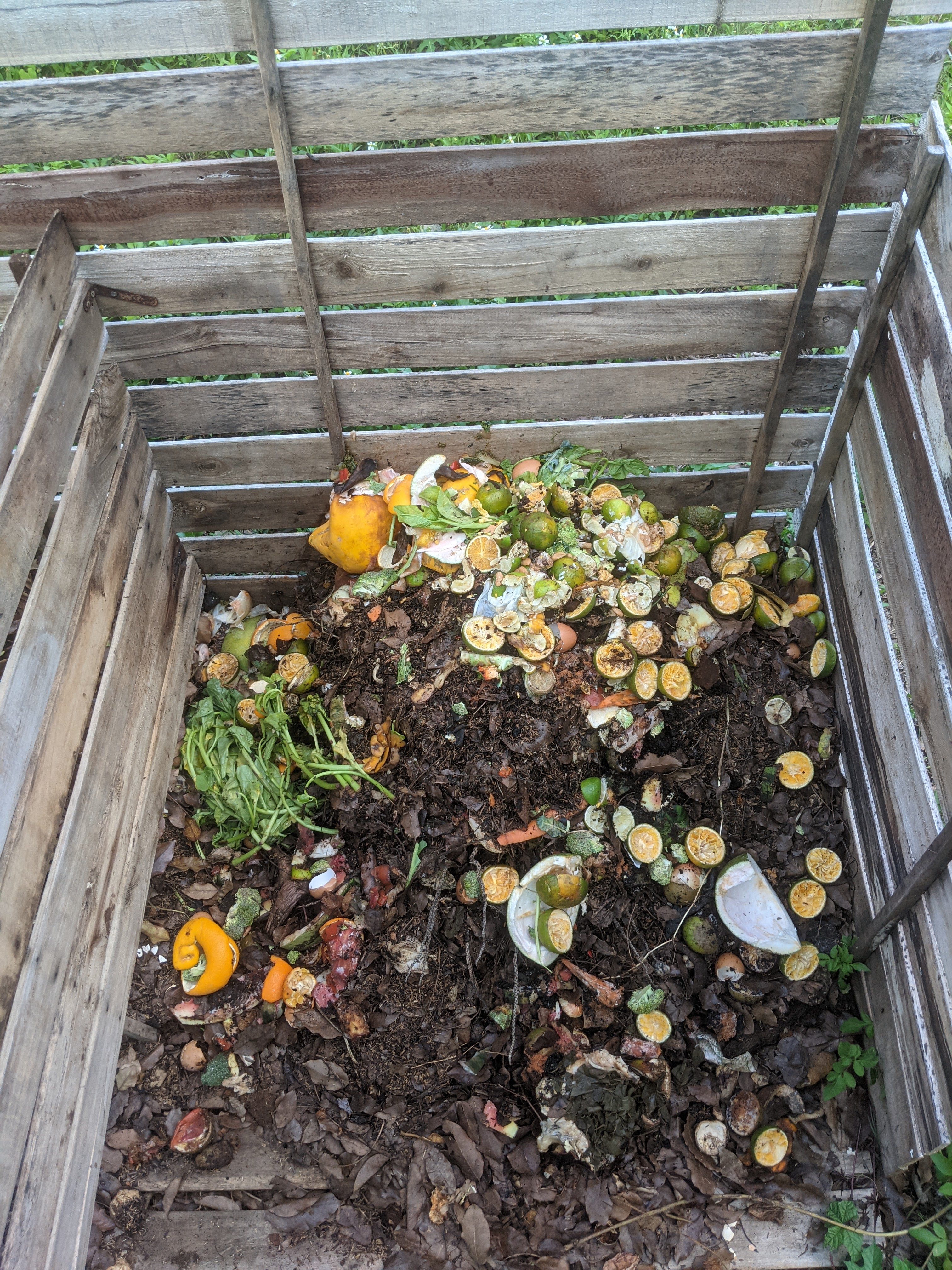 Curious about composting? It’s simpler than you think! There are just four very simple steps to get you from “trash to treasure.”
Curious about composting? It’s simpler than you think! There are just four very simple steps to get you from “trash to treasure.”
Set up your kitchen space – This is the make-or-break stage. Your system’s success is directly proportional to the convenience of your kitchen setup. Got a well-placed bin, old container, or small bucket with lid that you dump every day? You’re aces. But if you have to walk your food scraps more than a couple of steps from the food prep area, you can kiss your composting dreams goodbye.
Set up your backyard space – An open pile in the corner of your backyard totally works. But if you want some more structure or need to hide it away, there are a few great alternatives. Pallet boards are usually free. Grab a few heat treated pallets (if you don’t see an “HT” somewhere, it’s best to avoid it), a handful of screws, and you can easily build a 3-or-4-walled structure to keep your compost pile tucked away.
– Not in the mood for amateur carpentry? Gainesville and County residents can reach out to Alachua County’s Office of Solid Waste and Resource Recovery to get a free wire roll.
– Lastly, if you’re feeling spendy, you can buy some sort of compost container, such as a tumbler or pre-built bin, but our recommendation would be to search online for a used one first. We want to avoid buying new stuff when we’re ostensibly trying to reduce waste.
Train your family or roommates – If they’re new to this, it will be a shock at first. Some of them will be disgusted at the mere premise. But if you make it abundantly clear what materials are and are not accepted (fruit and veggies, yes. Anything plastic, no) and maybe a little of the why behind it, you will eventually see the most staunch critic soften and become the biggest compost cheerleader.
Be patient – Composting is a natural process, and nature takes time. Encouraging new behavior also takes time. You will learn a lot about the decomposition process and about managing your household waste better. Observe what works and doesn’t in your backyard compost pile: if it’s very dry, it may help to water it. If it stays too wet, add more woody, leafy material (also known as “browns”).
There’s only one wrong way to compost: not doing it at all. Anything other than that will be fine. If you have any questions, or want to show us pictures of your beautiful compost piles, message us @ZeroWasteGNV on Facebook and Instagram.
Take Pride in Your Neighborhood with the Adopt-A-Street Program
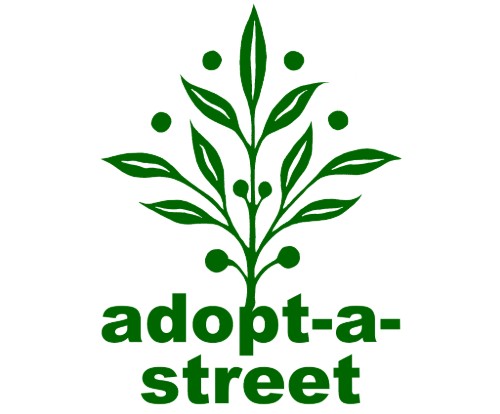 The City of Gainesville’s Adopt-A-Street program exists to safely and positively address roadside litter in our community. The program comprises a diverse group of participants dedicating their time to keep Gainesville clean. Active Adopt-A-Street members include local civic groups, businesses, sports clubs, college organizations, families, and even some individuals. It is these volunteers that keep this program going strong.
The City of Gainesville’s Adopt-A-Street program exists to safely and positively address roadside litter in our community. The program comprises a diverse group of participants dedicating their time to keep Gainesville clean. Active Adopt-A-Street members include local civic groups, businesses, sports clubs, college organizations, families, and even some individuals. It is these volunteers that keep this program going strong.
Any business, non-profit organization, or citizen group in Gainesville is eligible to apply to adopt up to a two-mile section of a city street. Each group must commit to removing litter at least six times each year, remain in the program for at least two years, and a representative of the group must successfully complete a safety training session. The City has clean-up kits available, consisting of safety vests, plastic bags, gloves, first aid kit, and litter sticks for the purpose of litter removal.
Adopting a street is a great way to help beautify our community and show your civic pride. Also, seeing volunteers at work is a visible reminder to others that littering is not okay. If you are interested in adopting a City street, please contact the Solid Waste Division at 352-334-2330 or email waste@gainesvillefl.gov.
If you are interested in short-term community service projects or adopting a county road, please contact Keep Alachua County Beautiful at 352-371-9444 or visit www.KACB.org.
Follow @ZeroWasteGNV on Facebook and Instagram for more service opportunities.
Florida Landfills Run Out of Room
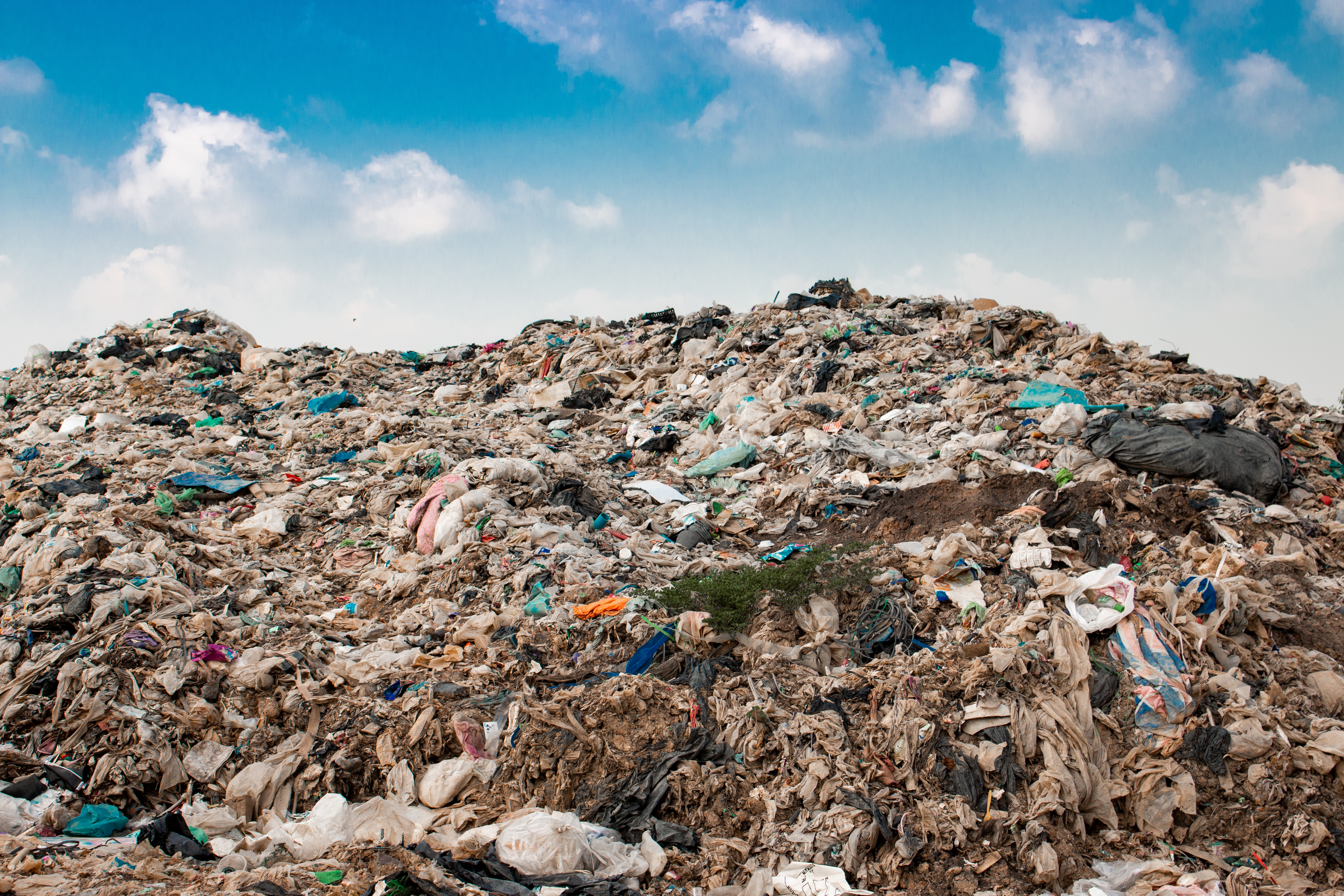 Did you know that Florida’s landfills will run out of capacity by 2030? Did you also know that every day in America, we throw out roughly 30% of our food, nearly half of our recyclables, and countless tons of usable furniture, appliances, clothes, and electronics?
Did you know that Florida’s landfills will run out of capacity by 2030? Did you also know that every day in America, we throw out roughly 30% of our food, nearly half of our recyclables, and countless tons of usable furniture, appliances, clothes, and electronics?
Landfilling is far from an elegant solution: put stuff in a hole, and make sure the hole is far away.
But it is an effective way of moving unwanted materials away from where we live. Combined with sewage and wastewater systems, it’s part of the infrastructure of the modern world that results in more sanitary lifestyles and better societal health outcomes.
However, landfills have frighteningly finite space, so what can we do?
The answer starts upstream, with what gets manufactured and what gets consumed. If furniture, electronics, and clothing stores all had takeback programs, it would go a long way toward reducing our collective burden on our very limited landfill space. And we can advocate for more progress in that arena with things like Extended Producer Responsibility (or EPR).
But there are still actions we can take. TODAY!
Refuse unnecessary things. Rethink shopping habits. Start composting. Buy secondhand whenever possible. Shop local. Repair and donate whenever possible. Recycle the accepted items. And talk to your friends and neighbors about ways to reduce waste.
For more on this topic, follow @ZeroWasteGNV on Facebook and Instagram .
Overwrap? We’re Over It
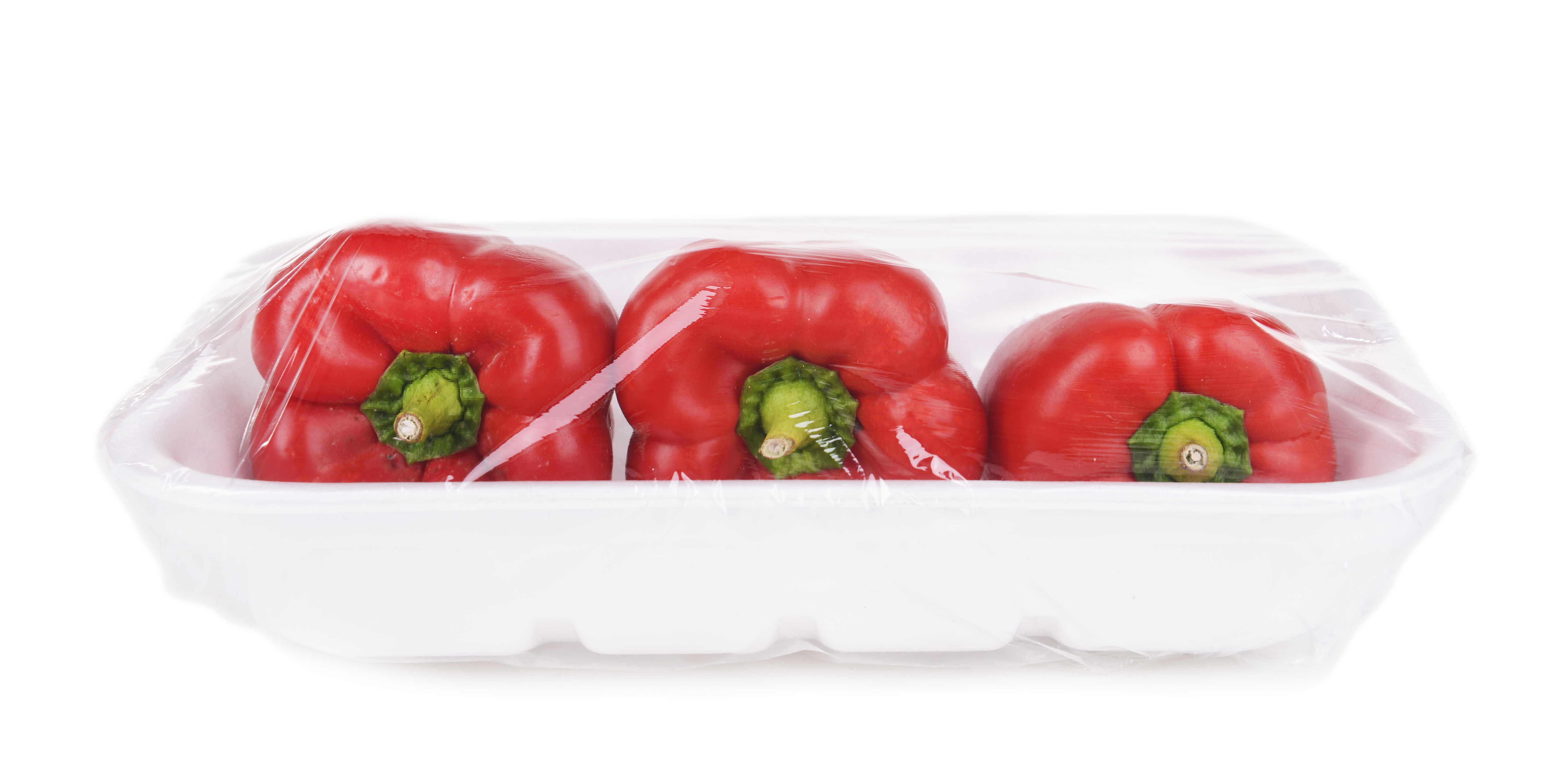 Have you heard of overwrap? It’s the term used for seemingly everything at the store being wrapped in a layer of thin, plastic film. And while there can be some beneficial uses – keeping medical items sterile, or providing proof an item was not tampered with – in most cases, it’s simply to keep the dust off, becoming just another unnecessary contributor to our staggering plastic problem.
Have you heard of overwrap? It’s the term used for seemingly everything at the store being wrapped in a layer of thin, plastic film. And while there can be some beneficial uses – keeping medical items sterile, or providing proof an item was not tampered with – in most cases, it’s simply to keep the dust off, becoming just another unnecessary contributor to our staggering plastic problem.
We’re so over overwrap, but it’s one problem that can’t be solved just by bringing your own reusable shopping bag to the store – so what can we do about it?
It starts with noticing the problem. Next time you’re at the store, look at all the cardboard boxes wrapped in plastic. Notice that even some plastic bottles and jugs are wrapped in plastic. As you look around, you will start to see that plastic overwrap seems almost inescapable.
If you think all this packaging is silly and would like to avoid generating that waste entirely, opt to shop local whenever you can. Local soap makers can sell you bars of soap without overwrap; local farmers can sell you fruit and veggies without plastic bags; and buying from bulk refill stores allows you to bring your own container to buy anything – from nuts, seeds, and coffee beans to laundry detergent and apple cider vinegar – without generating extra packaging waste.
If you often ask yourself how you can enjoy all the wonderful products you love, but you’re so over all that packaging, you might like following ZeroWasteGNV on Facebook and Instagram.
How to Recycle
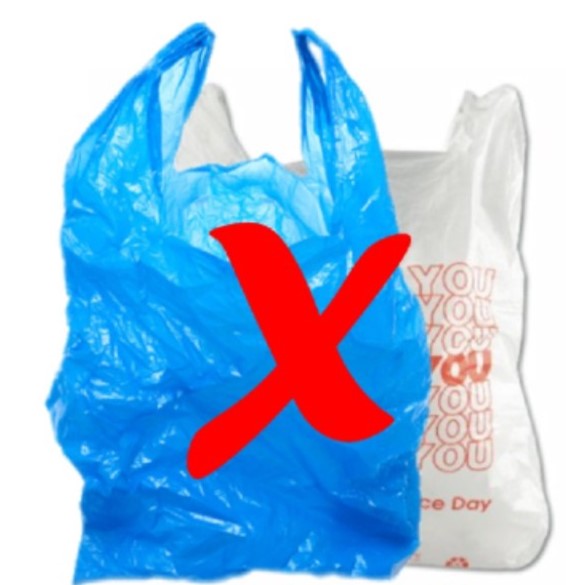 We think you’re already pretty clever, but here are a few things you may not have known about recycling:
We think you’re already pretty clever, but here are a few things you may not have known about recycling:
• Small lids, caps, and corks should be removed from containers before placing them in your recycle bin. Larger sized metal lids from glass jars can be placed back on once containers have been fully emptied.
• For Plastics - Only plastic bottles, jugs, jars, and tubs are accepted. No cartons and no clamshell containers or other non-rigid plastics, such as plastic bags, plastic wrap, or Styrofoam®.
• Pizza boxes are usually too food contaminated to recycle. If just the bottom of the pizza box is stained with grease, then the box's top can be removed and recycled. In an effort to reduce material going to the landfill, many like to compost the food-soiled portions of pizza boxes.
• Shredded paper must be placed inside a closed paper bag and labeled "Shredded Paper." Do not put shredded paper in plastic bags or loose inside your recycle bin.
For a complete list of items accepted for recycling, visit gainesvillefl.gov/WhatCanBeRecycled. For any other questions, please follow ZeroWasteGNV on Facebook and Instagram, or contact the Solid Waste Division at 352-334-2330.
Waste Stream Investigators: Following Up
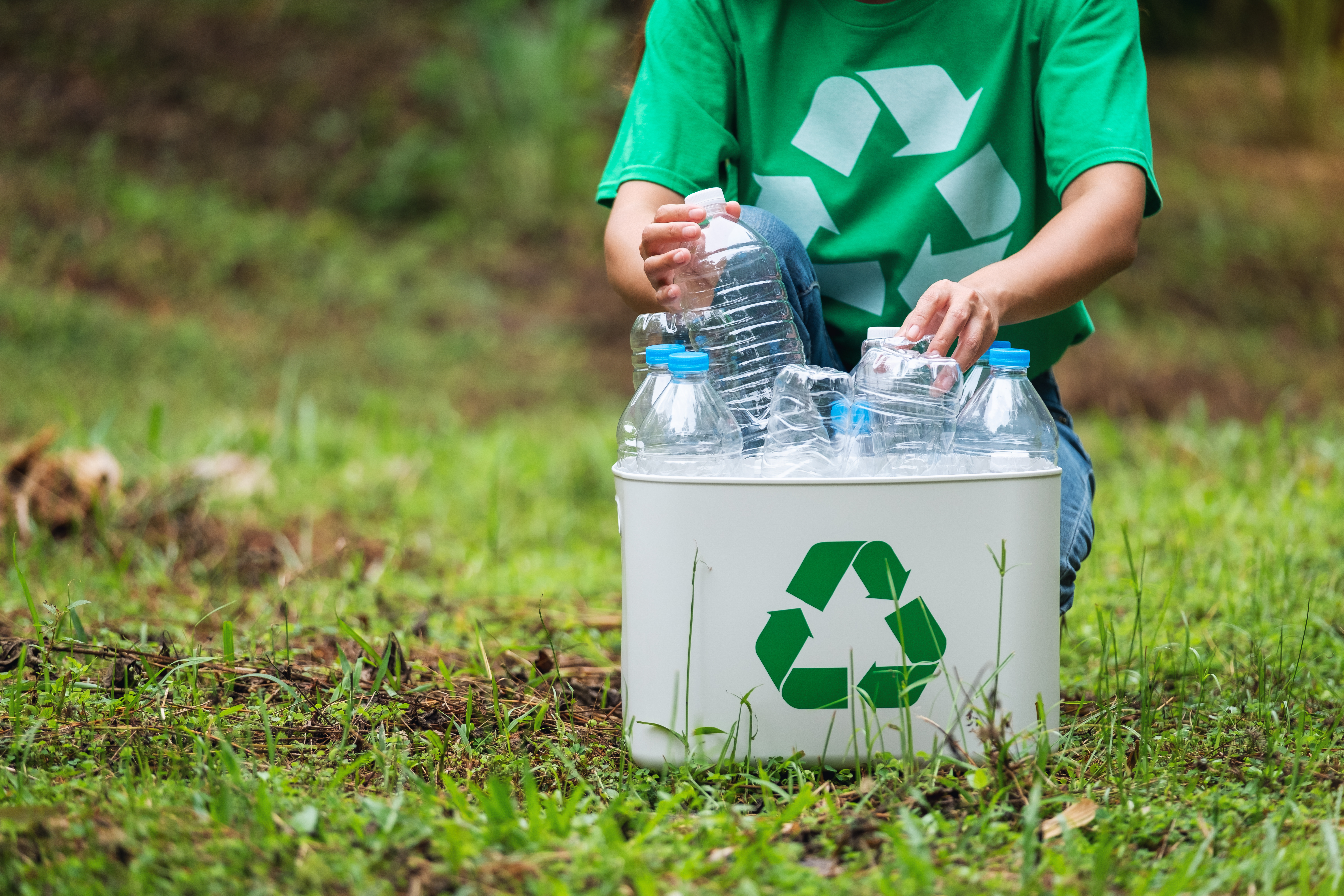 So your home or business performed a waste audit – a careful analysis of the trash you produce. What did you find?
So your home or business performed a waste audit – a careful analysis of the trash you produce. What did you find?
Probably a lot of packaging and likely a surprising amount of organic material – a good reminder it’s never too late to start that compost pile or worm bin.
Now, what would you find if you looked through your own recycle bin? While recycling is great as a last ditch effort to keep certain materials out of the landfill, let’s look for ways to rethink, refuse, reduce, reuse, refill, and repurpose.
Here are three small Zero Waste tweaks you can try implementing by looking in your own recycle bin:
1. Ditch the carton – cartons are no longer an accepted material in your recycle bin, but you can avoid buying them by making your own plant milks, fruit juices, chicken broths, and just about anything else you used to get in cartons. You’ll save money, enjoy fresher, better tasting food, and be a zero waste hero.
2. Try a filter or just the tap – Got a bunch of water bottles cracking and crunching around in your blue bin? It’s great you’re recycling, but have you ever considered using a water filter? Maybe skip the cheaper filters that will break after a year and invest in something more durable.
3. Make your own soda – Love soda? So do we! That’s why we invested in an at-home soda machine. There are many available secondhand, and the tanks of gas are refillable at local stores. Love beer or wine? Consider homebrewing or buying from local bottlers that will work on a container deposit system (just like the milkman in the old days). You’ll end up saving money and enjoying a higher quality libation
For more ways to improve how you consume and dispose of things in your daily life, follow ZeroWasteGNV on Facebook and Instagram.
Waste Stream Investigators
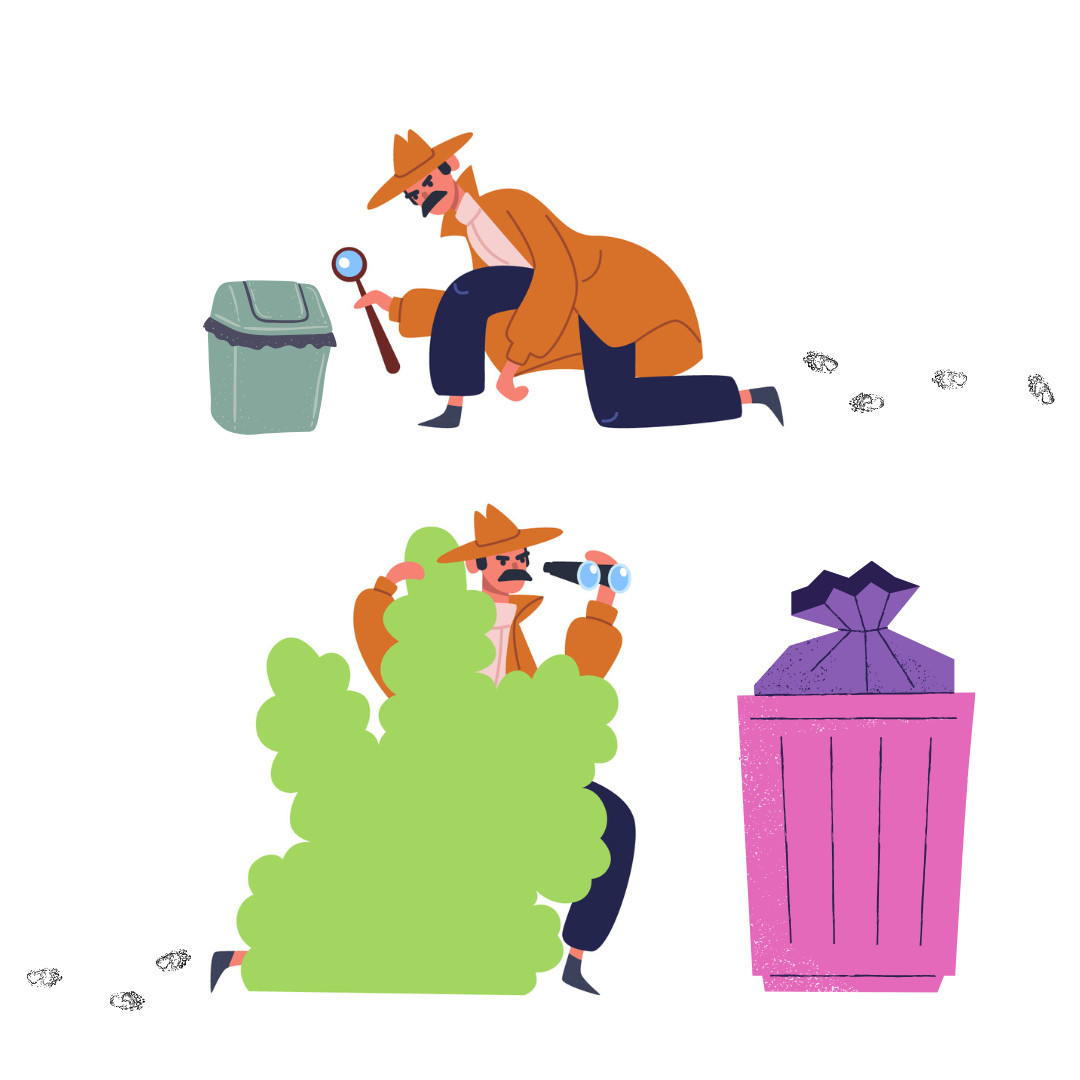 One of the main aims of the Zero Waste Initiative is to reduce waste before it’s created. If that sounds hard, keep reading to find out how you can become a Waste Stream Investigator in your very own home.
One of the main aims of the Zero Waste Initiative is to reduce waste before it’s created. If that sounds hard, keep reading to find out how you can become a Waste Stream Investigator in your very own home.
Peeking in our trashcans lets us better understand the waste we routinely generate and consider ways to reduce it in the future.
How to get started:
1. Invite the whole family. Younger children may be especially keen to try this.
2. To avoid making a mess, find an area outside or in a garage where you can spread out a tarp, and please wear gloves.
3. Weigh your full trashbag.
4. Dump the contents of your trashbag onto the tarp, and begin sorting everything into piles. One method we like is to create the following separate categories:
- blue bin recyclables (bottles & cans)
- orange bin recyclables (paper & cardboard)
- organics (fruit & vegetable scraps, spoiled food, coffee grounds, moldy bread, etc.)
- single-use items that could have been avoided (plastic bags, extra takeout items such as condiment packets and cutlery, etc.)
5. Weigh or take photos of the individual piles.
6. Properly dispose of all the materials.
7. For the best data, consider rechecking after a few months to monitor changes.
Becoming a Waste Stream Investigator is the best way to take responsibility for the waste generated in your own home, increase waste reduction, build good habits, and save money.
Stay up to date with all things Zero Waste by following ZeroWasteGNV on Facebook and Instagram.
Zero Waste Tips for Hotels
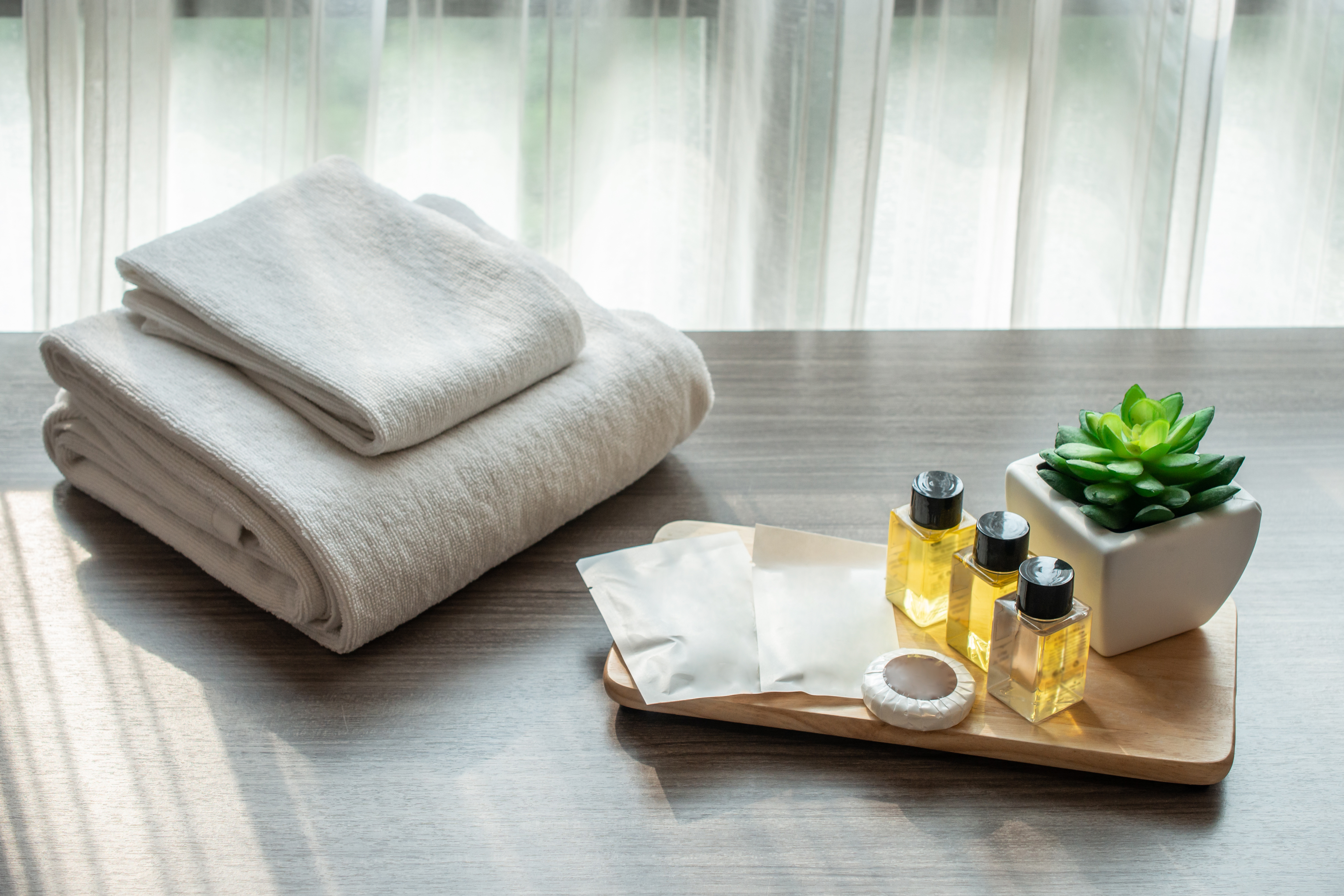 Did you know the average hotel buys and discards hundreds of thousands of single-use items every month?
Did you know the average hotel buys and discards hundreds of thousands of single-use items every month?
Single-use items are wasteful because they rely on materials (such as fossil fuels) being dug up from underground, shipped, refined, shipped again, manufactured into a product, packaged, and usually shipped again several more times before they arrive at their final destination. After being used only one time, the items get shipped again to get locked away forever in a landfill, where they simply take up space, never breaking down. Not only is this process massively wasteful, environmentally taxing, and inefficient, but hauling away all the trash created from single-use products is a cost to the businesses that provide these items, a cost they happily pass on to the consumer.
Are there alternatives to this model?
Let’s say you’ve just checked into your hotel. After a long day of travel, you might opt for room service. To wash your hands before the meal comes, you tear open a plastic bag for soap. Refillable soap dispensers are a sustainable option some hotels are turning to in order to reduce waste.
The meal arrives, and you open the disposable styrene box, rip open a plastic bag to get your plastic cutlery and disposable napkins, and open a few sauce packets. By using real plates and reusable cutlery, a hotel can realize huge savings on their trash hauling fees.
After your meal, another plastic bag contains your disposable toothbrush. A couple more plastic and foil pouches contain the shampoo and conditioner for an evening shower. Eco-friendly (and budget-minded) hotels are turning toward refillable shampoo, bodywash, and conditioner dispensers.
Enjoy your next hotel stay, knowing it can be a relaxing, sustainable, and nearly waste-free trip. Get more tips at gainesvillefl.gov/ZeroWasteNews, and follow @ZeroWasteGNV on Facebook and Instagram.
Zero Waste Tips for Restaurants – Invest in Reusables
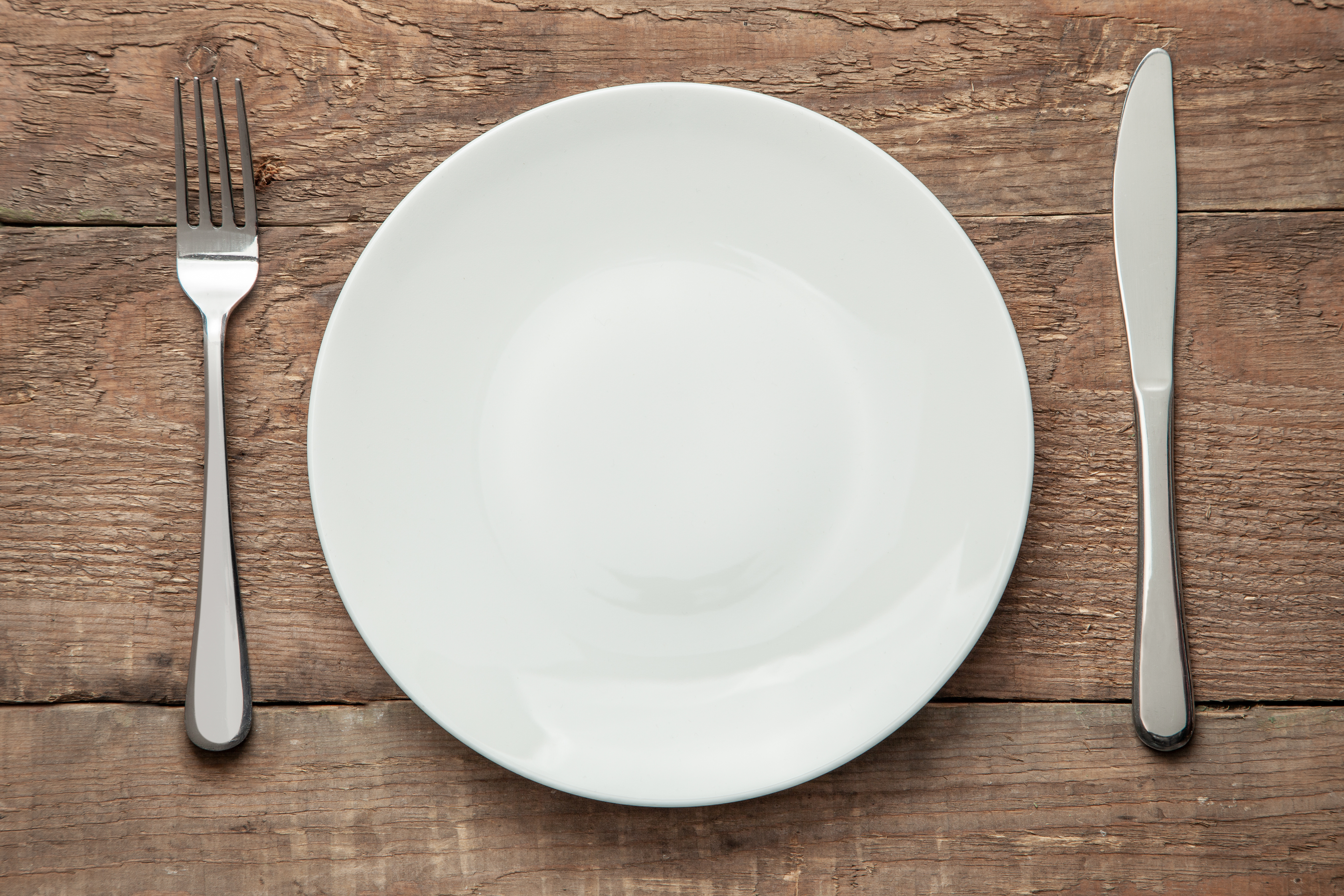 Paper plates and plastic forks are lightweight, right? But what if you’re going through more than 3,000 pounds of them per year?! That’s exactly how much one restaurant spared from the landfill by making a small investment – just $500 – in switching out all their wasteful, single-use dishware and cutlery with reusable alternatives.
Paper plates and plastic forks are lightweight, right? But what if you’re going through more than 3,000 pounds of them per year?! That’s exactly how much one restaurant spared from the landfill by making a small investment – just $500 – in switching out all their wasteful, single-use dishware and cutlery with reusable alternatives.
While this is a great example of upstream waste reduction – stopping thousands of pounds of waste before it’s created – the benefits didn’t stop there. The investment paid itself off after just several months and provided further cost savings moving forward. According to ReThink Disposable, a program from Clean Water Action and the Clean Water Fund, even accounting for the costs of labor and water to sanitize reusable plates, restaurants that made the switch went on to save thousands of dollars annually.
As with all good investments, this one will pay dividends in reduced waste hauling fees, reduced strain on limited landfill space, and an all-around more enjoyable dining experience.
Learn more about ReThink Disposable at cleanwater.org/campaign/rethink-disposable, and be sure to follow @ZeroWasteGNV on Facebook and Instagram for more.
Appliance Recycling Collection is Free! Find Out How To Schedule A Collection Appointment
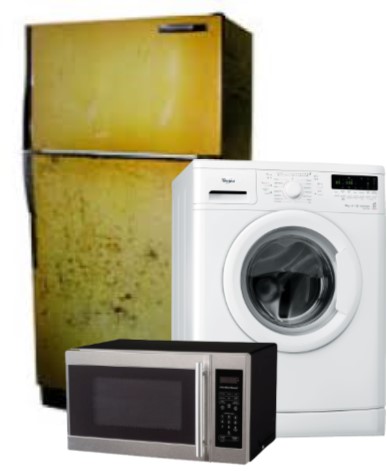 Did you know that the average appliance is 75% steel and that home appliances make up 10% of the steel recycled in the U.S. each year? It is important to recycle old appliances properly to ensure that metals are recycled and that Freon gases from refrigerated appliances are handled in an environmentally safe manner. There is no additional charge for this collection service for residential homes in the City of Gainesville.
Did you know that the average appliance is 75% steel and that home appliances make up 10% of the steel recycled in the U.S. each year? It is important to recycle old appliances properly to ensure that metals are recycled and that Freon gases from refrigerated appliances are handled in an environmentally safe manner. There is no additional charge for this collection service for residential homes in the City of Gainesville.
Household appliance accepted for collection include:
- Refrigerators & Freezers
- Stoves & Ovens
- Dishwashers
- Washer & Dryers
- Hot Water Heaters
- Air Conditioners (window units only)
City of Gainesville residents may schedule a FREE appliance collection appointment by contacting the Solid Waste Division at 352-334-2330 or online at Appliance Recycling Collection.
As always, find out all the ways you can safely reduce waste and dispose of unwanted items by following @ZeroWasteGNV on Facebook and Instagram.
The Magic Of The Zero Waste Wizard
 Would you like to try the most powerful waste reduction search tool ever produced for our community? Our Zero Waste Wizard will have you believing in magic again! Simply type the name of any material into the Zero Waste Wizard, and instantly get information about drop-off locations, including hours, a map, and directions. The best part is that it’s all presented in a hierarchy prioritizing repair and donation, recycling, and disposal.
Would you like to try the most powerful waste reduction search tool ever produced for our community? Our Zero Waste Wizard will have you believing in magic again! Simply type the name of any material into the Zero Waste Wizard, and instantly get information about drop-off locations, including hours, a map, and directions. The best part is that it’s all presented in a hierarchy prioritizing repair and donation, recycling, and disposal.
Try out the Zero Waste Wizard online at gainesvillefl.gov/WasteWizard. The all-powerful Zero Waste Wizard offers:
 A collection of over 400 searchable materials.
A collection of over 400 searchable materials.- Specific instructions for preparing materials different materials.
- An expanded and constantly evolving list of local reuse, donation, repair, sell & trade, and service options.
- Detailed information on each location, including hours open, a viewable map, and one-click directions.
- Translation into many languages, including Spanish & Chinese.
- Accessibility on mobile devices, so users can quickly look up materials on the go.
- The ability for users to offer material search suggestions.
Gainesville neighbors do a great job recycling, composting, and diverting waste from landfills. The new Zero Waste Wizard will make it even easier to determine what items can be recycled and reused. The Zero Waste Wizard will help support the City’s efforts to divert waste from our landfills.
What is Zero Waste?
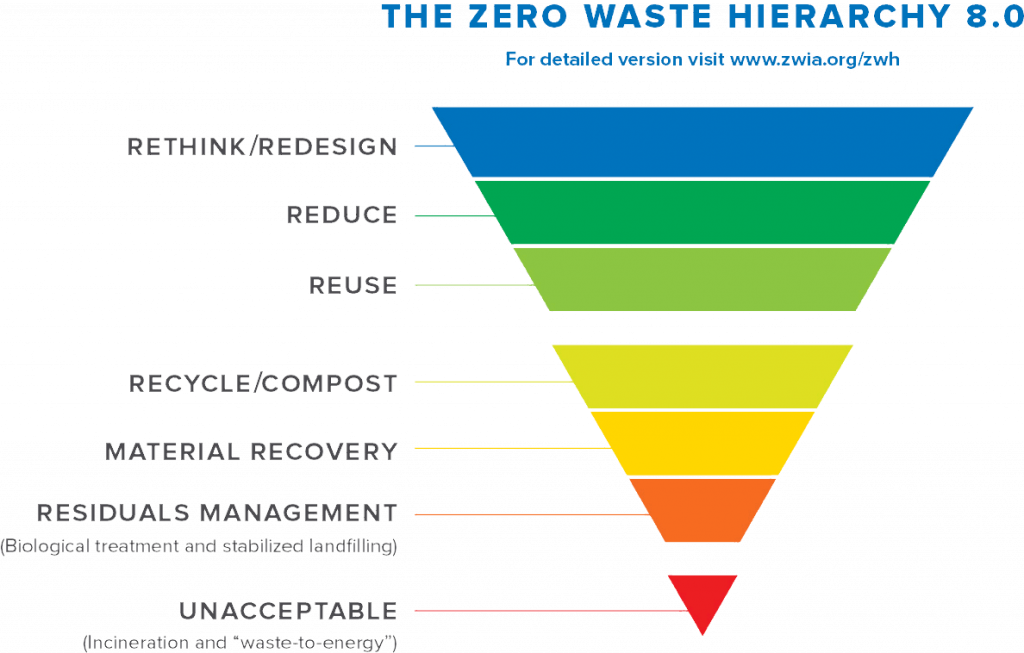 Have you ever heard people use the term ‘Zero Waste” but really weren’t sure what that meant? How can there be ‘zero waste’ anyway?
Have you ever heard people use the term ‘Zero Waste” but really weren’t sure what that meant? How can there be ‘zero waste’ anyway?
According to the Zero Waste International Alliance’s (ZWIA) peer reviewed definition, Zero Waste is “the conservation of all resources by means of responsible production, consumption, reuse, and recovery of all products, packaging, and materials without burning them and with no discharges to land, water, or air that threaten the environment or human health.”
Just what does all of that mean, and how can you do your part?
Responsible production – We can’t change what companies do, but we can “vote with our dollar” and support local, typically smaller companies, like at the farmers’ market.
Consumption – Do I really need a free water bottle, even though I brought my own reusable one?
Reuse – Before throwing it away or even recycling it, can I use it again? Recycling a glass jar is great, but using it as a jar repeatedly is infinitely more practical and less wasteful.
Recovery – Roughly 50% of our waste stream consists of valuable resources we can put to good use to good use by recycling.
Without burning (burning trash) – also known as “Waste-to-Energy,” which can release harmful substances, such as PFAS, to the land, water, and air. These substances can harm our land, water, animals around us, the food we eat, and our health.
We may never reduce waste all the way to zero, but we can follow the Zero Waste hierarchy and do our best for our planet, its resources, and our health.
If you’d like to keep learning about international Zero Waste efforts, please check out zwia.org. For local Zero Waste, gainesvillefl.gov/ZeroWaste and @ZeroWasteGNV on Facebook and Instagram have got you covered.
Setting Up a Home Zero Waste System - Start Small and Build Sustainable Habits
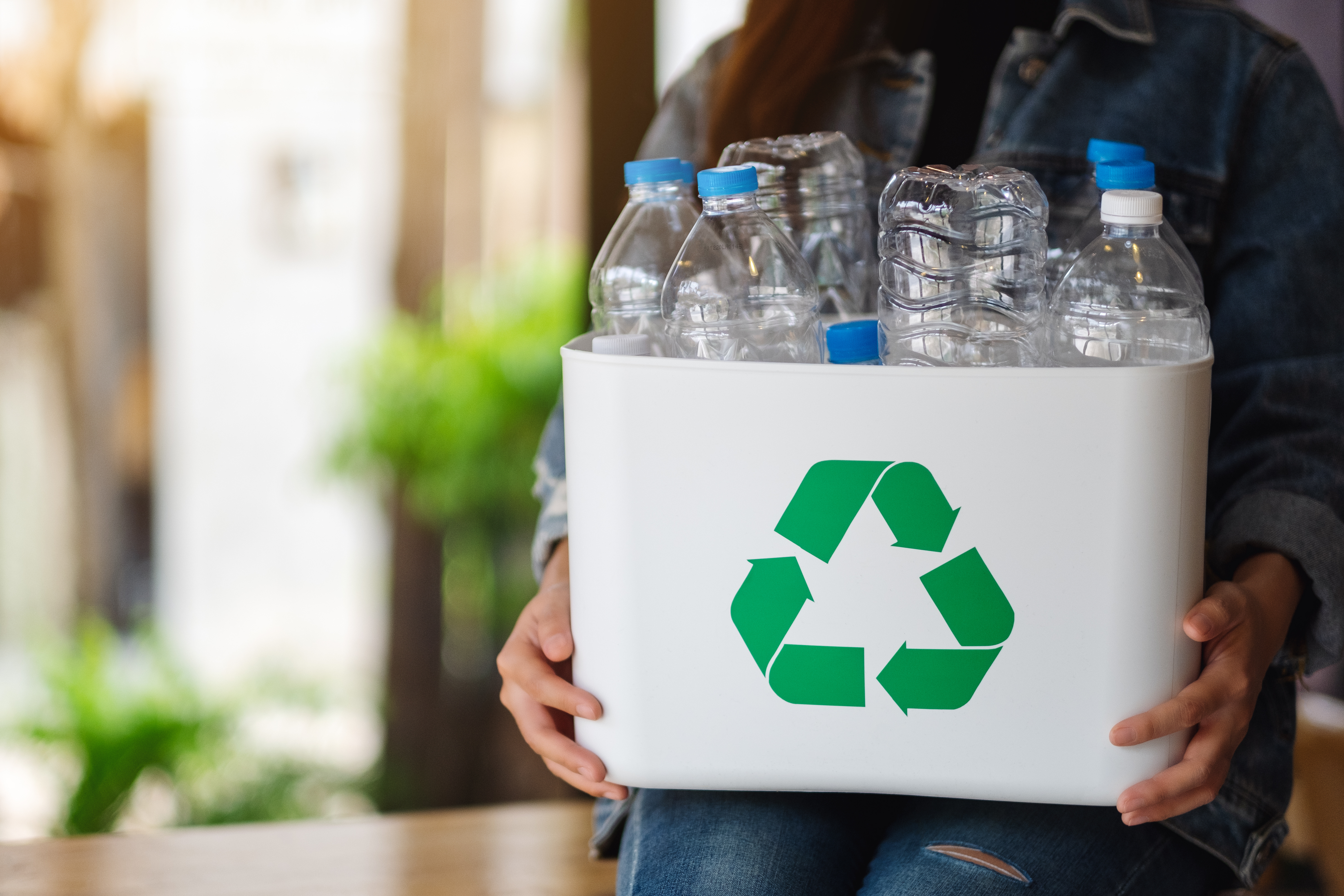 With the rising popularity of Zero Waste, we all want to know how we can join the party. It turns out it’s easier than we thought, and we can do our part right here at home.
With the rising popularity of Zero Waste, we all want to know how we can join the party. It turns out it’s easier than we thought, and we can do our part right here at home.
The greatest contributions to the Zero Waste movement are the ones we can sustain – day in and day out – and the ones that don’t cost us anything. So, before you run out and buy the latest gadgets and greenwashed doodads, you’re already reducing waste by starting with what you have at home.
- Be scrappy – your food scraps are more than just a single-use item. Bones, vegetable peels, and other inedible parts of food can be used as a soup starter or bone broth. Keep a small container or bag in your freezer, and put scraps in after every meal. When it gets full, make vegetable broth. Don’t let those good nutrients go to waste! After you make broth, the scraps can be further processed in a backyard compost pile, leaving the nutrients in circulation for the continued benefit of your environment.
- Be water-wise – for many, modern life means an abundance of fresh, clean, potable water. Unfortunately, this can cause us to take this precious resource for granted. Start by turning on the water only while you’re using it – no more letting the water run down the drain while you brush your teeth. For the next level, consider the benefits a greywater system might bring.
- Box it up – collect your recyclables in a small box on the kitchen counter, under the sink, or near the trash can. Setting up a space for your recyclables indoor – one you’ll actually see – increases the chance of recycling more of our precious resources, like metal, glass, and paper.
Home is where the heart is, and it’s also where the best Zero Waste changes can take place. Make gainesvillefl.gov/ZeroWaste your home away from home, and follow ZeroWasteGNV on Facebook and Instagram